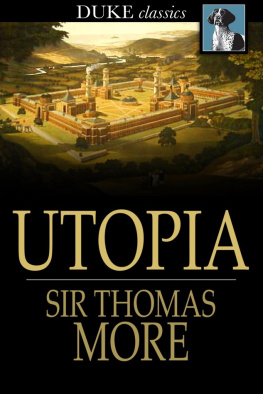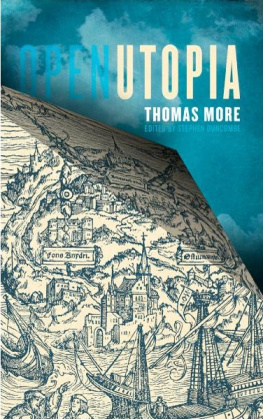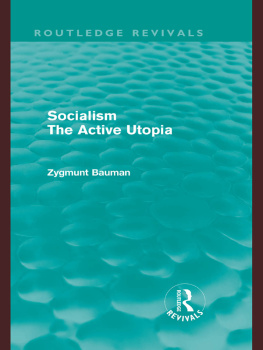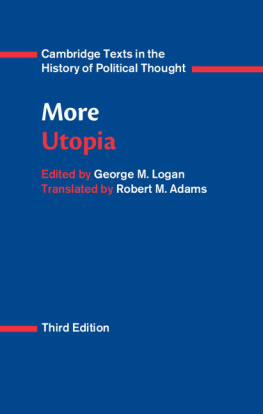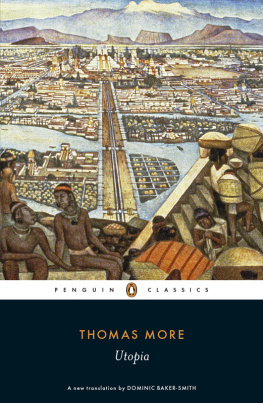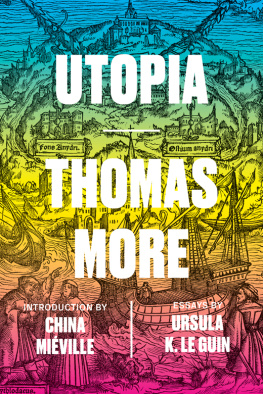UTOPIA
ON THE BEST STATE OF A REPUBLIC AND ON THE NEW ISLAND OF UTOPIA
* * *
SIR THOMAS MORE
*
Utopia
On the Best State of a Republic and on the New Island of Utopia
From a 1901 edition
ISBN 978-1-62011-669-2
Duke Classics
2012 Duke Classics and its licensors. All rights reserved.
While every effort has been used to ensure the accuracy and reliability of the information contained in this edition, Duke Classics does not assume liability or responsibility for any errors or omissions in this book. Duke Classics does not accept responsibility for loss suffered as a result of reliance upon the accuracy or currency of information contained in this book.
Contents
*
Introduction
*
Sir Thomas More, son of Sir John More, a justice of the King's Bench, wasborn in 1478, in Milk Street, in the city of London. After his earliereducation at St. Anthony's School, in Threadneedle Street, he was placed,as a boy, in the household of Cardinal John Morton, Archbishop ofCanterbury and Lord Chancellor. It was not unusual for persons of wealthor influence and sons of good families to be so established together in arelation of patron and client. The youth wore his patron's livery, andadded to his state. The patron used, afterwards, his wealth or influencein helping his young client forward in the world. Cardinal Morton hadbeen in earlier days that Bishop of Ely whom Richard III. sent to theTower; was busy afterwards in hostility to Richard; and was a chiefadviser of Henry VII., who in 1486 made him Archbishop of Canterbury, andnine months afterwards Lord Chancellor. Cardinal Mortonof talk atwhose table there are recollections in "Utopia"delighted in the quickwit of young Thomas More. He once said, "Whoever shall live to try it,shall see this child here waiting at table prove a notable and rare man."
At the age of about nineteen, Thomas More was sent to Canterbury College,Oxford, by his patron, where he learnt Greek of the first men who broughtGreek studies from Italy to EnglandWilliam Grocyn and Thomas Linacre.Linacre, a physician, who afterwards took orders, was also the founder ofthe College of Physicians. In 1499, More left Oxford to study law inLondon, at Lincoln's Inn, and in the next year Archbishop Morton died.
More's earnest character caused him while studying law to aim at thesubduing of the flesh, by wearing a hair shirt, taking a log for apillow, and whipping himself on Fridays. At the age of twenty-one heentered Parliament, and soon after he had been called to the bar he wasmade Under-Sheriff of London. In 1503 he opposed in the House of CommonsHenry VII.'s proposal for a subsidy on account of the marriage portion ofhis daughter Margaret; and he opposed with so much energy that the Houserefused to grant it. One went and told the king that a beardless boy haddisappointed all his expectations. During the last years, therefore, ofHenry VII. More was under the displeasure of the king, and had thoughtsof leaving the country.
Henry VII. died in April, 1509, when More's age was a little over thirty.In the first years of the reign of Henry VIII. he rose to large practicein the law courts, where it is said he refused to plead in cases which hethought unjust, and took no fees from widows, orphans, or the poor. Hewould have preferred marrying the second daughter of John Colt, of NewHall, in Essex, but chose her elder sister, that he might not subject herto the discredit of being passed over.
In 1513 Thomas More, still Under-Sheriff of London, is said to havewritten his "History of the Life and Death of King Edward V., and of theUsurpation of Richard III." The book, which seems to contain theknowledge and opinions of More's patron, Morton, was not printed until1557, when its writer had been twenty-two years dead. It was thenprinted from a MS. in More's handwriting.
In the year 1515 Wolsey, Archbishop of York, was made Cardinal by Leo X.;Henry VIII. made him Lord Chancellor, and from that year until 1523 theKing and the Cardinal ruled England with absolute authority, and calledno parliament. In May of the year 1515 Thomas Morenot knighted yetwasjoined in a commission to the Low Countries with Cuthbert Tunstal andothers to confer with the ambassadors of Charles V., then only Archdukeof Austria, upon a renewal of alliance. On that embassy More, aged aboutthirty-seven, was absent from England for six months, and while atAntwerp he established friendship with Peter Giles (Latinised AEgidius),a scholarly and courteous young man, who was secretary to themunicipality of Antwerp.
Cuthbert Tunstal was a rising churchman, chancellor to the Archbishop ofCanterbury, who in that year (1515) was made Archdeacon of Chester, andin May of the next year (1516) Master of the Rolls. In 1516 he was sentagain to the Low Countries, and More then went with him to Brussels,where they were in close companionship with Erasmus.
More's "Utopia" was written in Latin, and is in two parts, of which thesecond, describing the place (Nusquama, as he called itsometimes in his letters"Nowhere"), was probably written towards theclose of 1515; the first part, introductory, early in 1516. The book wasfirst printed at Louvain, late in 1516, under the editorship of Erasmus,Peter Giles, and other of More's friends in Flanders. It was thenrevised by More, and printed by Frobenius at Basle in November, 1518. Itwas reprinted at Paris and Vienna, but was not printed in England duringMore's lifetime. Its first publication in this country was in theEnglish translation, made in Edward's VI.'s reign (1551) by RalphRobinson. It was translated with more literary skill by Gilbert Burnet,in 1684, soon after he had conducted the defence of his friend LordWilliam Russell, attended his execution, vindicated his memory, and beenspitefully deprived by James II. of his lectureship at St. Clement's.Burnet was drawn to the translation of "Utopia" by the same sense ofunreason in high places that caused More to write the book. Burnet's isthe translation given in this volume.
The name of the book has given an adjective to our languagewe call animpracticable scheme Utopian. Yet, under the veil of a playful fiction,the talk is intensely earnest, and abounds in practical suggestion. Itis the work of a scholarly and witty Englishman, who attacks in his ownway the chief political and social evils of his time. Beginning withfact, More tells how he was sent into Flanders with Cuthbert Tunstal,"whom the king's majesty of late, to the great rejoicing of all men, didprefer to the office of Master of the Rolls;" how the commissioners ofCharles met them at Bruges, and presently returned to Brussels forinstructions; and how More then went to Antwerp, where he found apleasure in the society of Peter Giles which soothed his desire to seeagain his wife and children, from whom he had been four months away. Thenfact slides into fiction with the finding of Raphael Hythloday (whosename, made of two Greek words, means"knowing in trifles"), a man who had been with Amerigo Vespucci in thethree last of the voyages to the new world lately discovered, of whichthe account had been first printed in 1507, only nine years before Utopiawas written.
Designedly fantastic in suggestion of details, "Utopia" is the work of ascholar who had read Plato's "Republic," and had his fancy quickenedafter reading Plutarch's account of Spartan life under Lycurgus. Beneaththe veil of an ideal communism, into which there has been worked somewitty extravagance, there lies a noble English argument. Sometimes Moreputs the case as of France when he means England. Sometimes there isironical praise of the good faith of Christian kings, saving the bookfrom censure as a political attack on the policy of Henry VIII. Erasmuswrote to a friend in 1517 that he should send for More's "Utopia," if hehad not read it, and "wished to see the true source of all politicalevils." And to More Erasmus wrote of his book, "A burgomaster of Antwerpis so pleased with it that he knows it all by heart."

